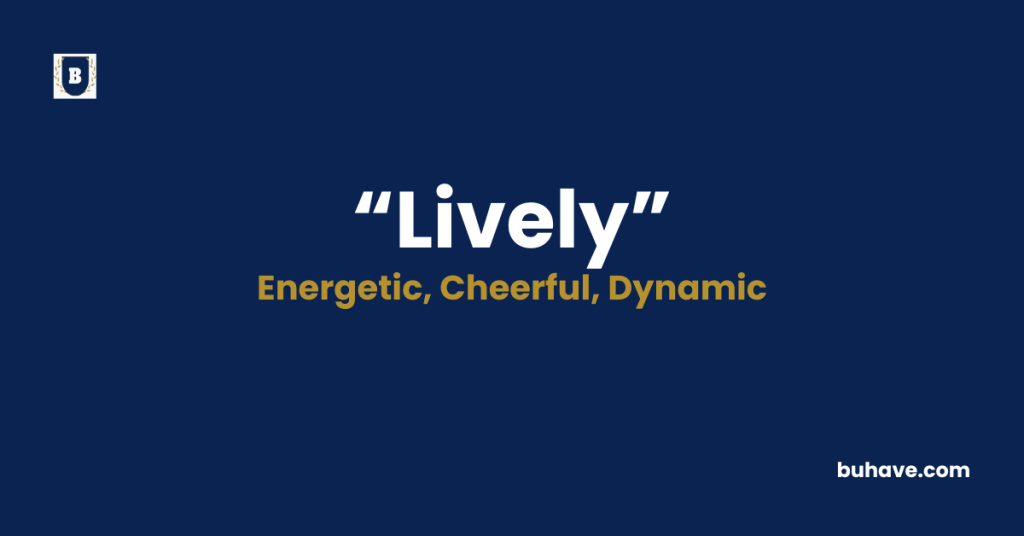The word ‘Lively’ (Adjective) describes someone or something that shows a lot of energy, enthusiasm, and vibrant spirit. At first, people often use this word to talk about individuals who are cheerful, animated, and full of life. in this guide, you’ll learn the full definition, synonyms, antonyms, etymology, and real-life examples of how to use ‘Lively’ correctly in sentences.
Lively Explained in Depth
A complete and detailed guide to the words Lively including meaning, definition, examples, etymology, synonyms, and antonyms.
Meanings of Lively
Lively means full of energy, excitement, and enthusiasm. At first, people often use this word to describe a person who moves, talks, or acts in a spirited and animated way. In addition, lively can describe places, events, or conversations that feel vibrant, colorful, and full of life. Moreover, it suggests not just movement or sound but a feeling of joy and dynamic energy that spreads to others. Eventually, it grew into a popular word for anything that feels active, fun, and bursting with positive spirit.
Today, when someone calls a person or situation it, they point to an atmosphere that feels bright, engaging, and alive with possibilities.
Definition:
Lively describes someone or something that shows a lot of energy, enthusiasm, and vibrant spirit. At first, people often use this word to talk about individuals who are cheerful, animated, and full of life. In addition, lively fits perfectly when describing places, conversations, or events that feel active, exciting, and colorful.
Moreover, lively suggests an environment where movement, laughter, and joy naturally fill the air. Eventually, the word grew to capture not just physical activity but emotional brightness as well. Today, when people call someone or something lively, they highlight the strong, positive energy that makes everything feel more engaging and alive.
Etymology:
The word “lively” has a cheerful and energetic history. Originally, it came from the Old English word “līflīc,” which meant “living” or “full of life.” At first, “līf” meant “life,” and the ending “-līc” (which later became “-ly”) meant “like” or “having the qualities of.” In addition, during the Middle English period, speakers began using “lively” to describe things that showed the spirit or energy of life. Moreover, people did not limit the word to describing only living creatures; they also used it for anything that felt vibrant, energetic, or spirited. Eventually, lively grew into a colorful word for people, events, music, and even conversations that felt full of movement and joy.
Today, when people use the word “lively,” they tap into centuries of language that celebrate energy, brightness, and the wonderful feeling of being fully alive.
Example Sentences:
- First, the children filled the playground with lively laughter and cheerful shouts.
- Moreover, the lively music at the festival kept everyone dancing long into the night.
- Meanwhile, she shared a lively story that made the whole room burst into laughter.
- In addition, the lively decorations transformed the plain hall into a colorful celebration space.
- Eventually, their lively discussion sparked new ideas that energized the entire
Lively Synonyms:
Lively Antonyms:
- Dull
- Boring
- Lethargic
- Lifeless
- Quiet
- Drab
- Somber
- Mellow
- Sluggish
- Inactive
FAQs about Lively
Sure! Here’s an FAQ-style format for the word “Lively”
1. What does “lively” mean?
Lively” describes something full of energy, life, or enthusiasm. It can refer to people, places, events, conversations, or even colors and music.
2. What are some synonyms for “lively”?
- Energetic
- Vibrant
- Animated
- Spirited
- Dynamic
- Bubbly
3. How is “lively” used to describe a person?
- A lively person is someone who is active, cheerful, and full of enthusiasm. They often bring energy to social situations and are perceived as engaging or fun to be around.
4. Can a place or event be lively?
Yes! For example:
- A lively party might have loud music, dancing, and excited guests.
- A lively café could be full of chatter, music, and bustling activity.
5. What’s the difference between “lively” and “loud”?
- “Lively” implies positive energy or enthusiasm.
- “Loud” refers specifically to high volume, which isn’t always positive. Something can be loud but not lively, and vice versa.
6. Is “lively” always a compliment?
Mostly, yes. However, in some contexts like describing a child or a debate it can imply someone or something is overly energetic, noisy, or hard to control.
7. How is “lively” used in writing or speech?
It can describe:
- People: “She has a lively personality.”
- Events: “It was a lively discussion.”
- Art or colors: “The painting has lively brushstrokes.”
- Music or rhythm: “A lively tune filled the room.”
8. How can I become more lively in my own life?
Stay physically active
- Engage with others enthusiastically
- Try new things and stay curious
- Smile and use expressive body language
- Fuel your passions and share the
Explore more L words
- Positive words that start with L
- Negative words that start with L
- Adjectives that start with L
- Names that start with L
- Nouns that start with L
- Verbs that start with L

















